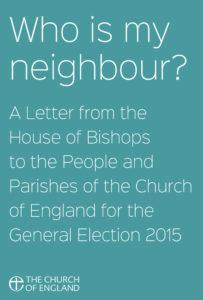The Prime Minister will not be short of advice as he appoints the Cabinet and prepares the Queen’s Speech. There is a particular bible story about accepting and weighing advice that I would suggest it might be helpful for him to read and ponder in the first days of the new government.
It’s a story about transition. King Solomon has died. All the tribes of Israel have gathered to make his son, Rehoboam, the new king. But there is widespread discontent. A delegation comes from the northern tribes, requesting an easing of their burdens.
Rehoboam has a choice to make and he asks for three days to reflect. He consults two sets of advisors. The first group, his father’s counsellors, advise him to listen to the people, to be their servant, to reach out to the disaffected and lead from this foundation.
The second group, his own contemporaries, give opposite advice. Discontent should be met with harshness. The burdens on the north should be increased still further. The new government should start as it means to go on.
Reheboam makes his choice. It is a fateful one. He listens to the younger, harsher, more strident voices. A few years later, the kingdom is divided, at war, impoverished and in chaos.
I have no doubt that David Cameron will receive both sorts of advice in the coming days. There will be those who counsel him to reach out to the whole nation, to connect with the disaffected, to listen to the people and to be their servant. But there will be those who see the Conservative majority as a mandate to fulfill and go beyond the manifesto commitments, blind to the risk of increasing the burdens of those who already bear the heavy load (of sickness, disability or the struggle to find sustainable employment).
The Prime Minister’s speech on the steps of Downing Street on Thursday moved clearly in the first direction. David Cameron spoke of one nation and sought to connect more deeply with those who had voted for other parties, with the people of Scotland, with the regions. He promised to bring our country together, to help working people and give “the poorest people the chance of training, a job and hope for the future”.
Much of this rhetoric is encouraging but now it needs to be supported and backed up with action. That action needs to be taken swiftly to begin to draw the United Kingdom back together again and begin to build for the future. The choices made in the next few days about priorities and plans for legislation in the next year are critical.
So here are some suggestions for a big, open offer from Mr Cameron to every part of the United Kingdom, and especially to those who voted for other parties.
- Make an early, concrete and clear commitment to safeguarding the environment and to leadership in the key climate conferences this year through the appointments you make and in the Queen’s Speech. Action on climate change is integral to economic growth.
- Abolish the bedroom tax. It hasn’t worked. It has generated more resentment than revenue. Repealing it would demonstrate a capacity for change and to think again.
- Promise an early review of benefits sanctions as part of the ongoing reform of welfare. Sanctions cause massive hardship. They are responsible for a significant number of people needing foodbanks. They are tangential to the main welfare reforms. In the meantime suspend sanctions for families with children and people suffering from mental ill health.
- Encourage the Living Wage as part of growing a sustainable, strong national economy.
- Take a long view of constitutional reform. Acknowledge the concern revealed by the election outcome. Entrust it to some kind of independent commission which has time and space to think. Don’t rush the key decisions which will affect the whole future of the United Kingdom.
- Revisit the Big Society ideas, if not the language. Place active partnership, between national and local government and the faith and voluntary sector, front and centre again, not as a replacement of government initiative but complementary to it. Make sure there is clear leadership for these ideas at Cabinet level.
- Accelerate the provision of truly affordable housing and prioritise this as part of investment in the future. Protect and strengthen social housing provision to ensure that everyone has access to a decent home at a price they can afford.
- Reach out to the English regions as well as to Scotland in swift and tangible ways. In particular make investment in the northern powerhouse a key priority for the first two years of the new government.
The word Minister means servant. A Prime Minister is called to be one who serves the whole nation. If Reheboam had listened to different advice the whole story of Israel would have been different. I hope that David Cameron will take a moment to read and ponder his story: to listen to all the people, to lighten burdens, and to build one nation, for the benefit of all.
+Steven Sheffield
(The story of Reheboam’s choice is told in 1 Kings 12)


